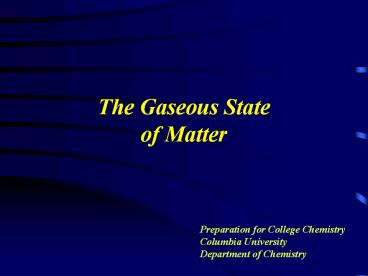The%20Gaseous%20State%20of%20Matter - PowerPoint PPT Presentation
Title:
The%20Gaseous%20State%20of%20Matter
Description:
Gay-Lussac's Law of combining volumes. Avogadro's Law. 1809. 1811 ' ... 1. Explanation of Gay-Lussac's combining volumes. law. Diatomic nature of elemental gases. ... – PowerPoint PPT presentation
Number of Views:376
Avg rating:3.0/5.0
Title: The%20Gaseous%20State%20of%20Matter
1
The Gaseous Stateof Matter
Preparation for College Chemistry Columbia
University Department of Chemistry
2
Chapter Outline
KMT
Gas Laws
Ideal Gas Equation
Gas Stoichiometry
Air Pollution
3
Preliminary Observations
Molar mass of water 18g /mole
6.02x1023 molecules weigh 18g
Density of water 1g/cc
18 g liquid water occupies 18mL
18 g gaseous water occupies 22,400mL
4
Kinetic Molecular Theory of Gases
2
1
p
2
m
c
p m c
KE
2
2m
v10cm/s
-x
x
v-10cm/s
c10cm/s
c10cm/s
Wall
5
Kinetic Molecular Theory of Gases
6
Distribution of Molecular Speeds
O2 at 25C
O2 at 1000C
7
Grahams Law of Effusion
At the same T and P, the rates of Effusion of
two gases are inversely proportional to their
densities or molar masses.
8
Naturally occurring Uranium U-235 / U238 1 /
140
1st step U 6 F
2nd step Effusion through thousands of membranes
(cascades)
Vacuum
Gas
Fully enriched weapons-grade Uranium
9
State Variables
V volume (liters, cm3, m3)
T temperature (in K)
P pressure (atmospheres, mmHg, kPa)
10
Torricellis barometer
760 torr
760 mmHg
76 cmHg
101.325 mbar
29.9 in. Hg
14.7 lb/in2 (PSI)
1 atm
At sea level
11
Atmospheric Pressure
150 km
Hg height
air
12
Boyles Law
At Constant TFor an Ideal Gas
P x V k
P1 x V1 P2 x V2
P2
P1
V1
V2
13
Charles Law
At Constant P for an Ideal Gas
V2
V1
V? T
T2
T1
V kT
Absolute zero
-273C
14
Gay-Lussacs Law
P2
P1
At Constant V for an Ideal Gas
P? T
T2
T1
P kT
15
Combined Gas Laws
Charles
Boyles
P1 V1 P2 V2
16
STP Conditions
Reference Points for T and P for comparison
Standard Temperature 273.15 K 0.00C
Standard Pressure 1 atm
17
Daltons Law of Partial Pressures
Ptot P1 P2 P3 ...
where P1 is the partial pressure of gas 1, etc...
Pn
Xn
Ptotal
nn
Molar fraction of gasn
Xn
n1
n2
n3
...
Pgas Ptotal PH2O
where PH2O is the vapor pressure of water at the
specified temperature. Most often used in
collection of insoluble gases over water. In open
systems, Ptotal Patm
18
Gay-Lussacs Law of combining volumes
When measured at the same T and P, the ratios of
the V of reacting gases are small whole numbers
Avogadros Law
Equal volumes of different gases at the same T
and P containthe same number of molecules
19
Consequences of Avogadros Law
1. Explanation of Gay-Lussacs combining volumes
law. Diatomic nature of elemental gases.
2. Method for determining molar masses of gases.
The molar Volume.
3. Firm foundation of KMT gases consists of
microscopic particles
20
Density of Gases
But V f (P, T)
21
Ideal Gas Equation
Equation of State
For one mole of a gas at STP, R constant
22
Ideal Gas Equation
The ideal gas constant has energy/mol degrees
dimensions
R
R
R 8.134 J mol-1 K-1 2 Cal mol -1 K-1
23
Gas Stoichiometry
Concentrated nitric acid acts on copper and
produces nitrogen dioxide and dissolved copper.
6.80 g Cu is consumed and NO2 is collected at a
pressure of .970atm and a temperature of 45C
(318 K) . Calculate the volume of NO2 produced.
x
6.80 g Cu
x
0.214 mol NO2
5.76 L NO2
http//www.sp.uconn.edu/terry/229sp98/Ncycleanim.
html
24
Real Gases
Follow the ideal gas law at sufficiently low
densities
- Gas molecules attract one another
- Gas molecules occupy a finite volume
Both factors increase in importance when the
molecules are close together (high P. low T).
Deviations from ideality are quantified by the
Compressibility factor z
25
Real Gases
Intermolecular Forces
N2
H2
Ideal Gas
CH4
26
Nitrogen at several T
25 C
600 C
Ideal Gas
-100 C
27
Van der Waals Equation
b constant representing volume excluded per
mole of molecules
a depends on the strength of attractive forces
Proportional to reduction of wall collisions
due to cluster formation.
28
Air Pollution
l
2O
O2
O3
Allotropic Transformation
O2
O
l
Ozone shield
O
heat
O2
O3
l
Ozone destruction
CCl3F
CCl2F
Cl .
Cl .
ClO .
O2
O3
ClO .
O
O2
Cl .

